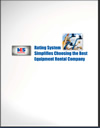
The CDC reports 2000 workplace eye injuries per day. Almost $4 billion in lost wages and productivity were the result in a recent year, according to the Bureau of Labor Statistics. Seen simple-to-institute tips from research studies and safety professionals could make an immediate and lasting impact.
Sponsored by Nanofilm

Independent research studies indicate fogging as a factor in safety eyewear usage. A review of results and recommendations.
Sponsored by Nanofilm

Renting equipment instead of spending large amounts of capital to own the same thing is often justified by today’s tighter budgets, reduced workforce and wide variety of projects.
There is a measurement tool available that can provide an accurate and quick way for customers to objectively evaluate and compare the abilities of different equipment rental companies.
Sponsored by NES Rentals
Members of the 750,000-person Handyman Club of America tested Defog It anti-fog towelettes for safety glasses, safety goggles, faceshields and eyeglasses. Club members, who include DIY-ers and professionals, put them to work on the jobsite and in their home workshops.
Sponsored by Nanofilm
“During the time of testing there were frequent temperature variations from below freezing to 60+ degrees.. At no time did I encounter the lenses fogging in these conditions."
Sponsored by Nanofilm
When clear vision can be the difference between life an death, fogged eyewear isn’t an option. No one knows that better than members of the Hopkinton, Massachusetts, Fire Department.
Sponsored by Nanofilm

Avery Dennison purchased its Schwelm plant from a family-owned German company in 2001. Very few of their employees had a sense of safety awareness. The incident rate was high and there was no culture of safety within the organization. In 2005, Avery Dennison began training employees in Schwelm. Changes were soon apparent when employees discovered their decisive role in ensuring a successful safety program.
Sponsored by Dupont Sustainable Solutions, Training Solutions

Without a centralized training and development group to develop a global strategy Dresser-Rand relied
on 637 training vendors worldwide. The company was spending an incredible amount of money and the learning was never measured. The Coastal eLearning System was rolled out and ”Dresser-Rand will benefit from a cost avoidance of approximately $1 million this year”.
Sponsored by Dupont Sustainable Solutions, Training Solutions

Combustible dust has been the culprit of deadly
work-place blasts for decades, but it wasn’t until
an explosion in 2008 that killed 14 people at
the Imperial Sugar Refinery in Port Wentworth,
Ga, that the issue began getting the attention
it deserved. OSHA stepped in, reissuing its
Combustible Dust National Emphasis Program
and the industrial world became inundated with
statistics, definitions and preventative measures.
Sponsored by Nilfisk CFM

Since L-3 implemented the AED program in 2005, eight employees have been saved because an AED was on-site and people were trained to respond to someone in sudden cardiac arrest.